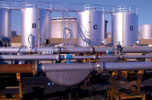
Expert on custody transfer metering and leader of the Fluid Management Solutions team at Endress+Hauser in Europe, Ton Leenhoven, visited Endress+Hauser South Africa recently to provide training on custody transfer and FMS products, and host a custody transfer conference in Johannesburg.
Leenhoven felt that recent progress in the field of custody transfer meter development warranted an in-depth local session on the benefits resulting from the latest technological advances. Custody transfer metering revolves around exchanging ownership of a determined quantity of fluid, such as refined petroleum products, a process often driven by a flowmeter, combined with a batch controller, to produce a bill of lading (the decisive presentation according to local legal metrology regulations).

"Endress+Hauser Coriolis flowmeters are ideally suited to custody transfer applications, since their accuracy (maximum permissible error) complies with international regulations and recommendations for custody transfer (CT)," says Leenhoven. "Field proven tests on different petroleum products, witnessed by competent bodies around the world, have proven their high accuracy. Coriolis flowmeters also have the capability of communicating with a large variety of CT batch controllers and flow computers, in use by many customers.
Conducting field calibration tests of running multiple Coriolis flowmeters in parallel has shown excellent results when tested against various internationally approved flow rigs that use hydrocarbons with varying densities as a fluid. In Leenhoven's example he used results from approved large volume ball provers, compared with two 250 mm Coriolis flowmeters running on a crude oil line, the maximum error remained within 0,07% in a band over a 20:1 turndown ratio (3000 m³/h down to 150 m³/h). Further field tests at customer sites, comparing ship to shore figures, re-proved these test results.
To achieve such outstanding results, Leenhoven believes it is of the utmost importance to understand the customer's requirements, how to apply international standards, and how to translate this into a feasible systems solutions package. "What I mean by that is, our Coriolis meters are able to measure the mass and density compensated volumetric flow of fluid very accurately.
"The benefit of mass flow measurement over a volume flow measurement is that a mass quantity remains the same under all conditions. This means that variations in temperature or pressure do not affect the mass flow. On the contrary, volume flow measurement is directly affected by the fluid's temperature (thermal expansion) and pressure (compressibility). For these effects, we have to compensate accurately by applying the appropriate API standards."
Describing the next generation of flowmeter to be developed, Leenhoven says: "The more we learn about flowmeter behaviour, whether its operating principle is based on Coriolis Effect, ultrasonic or magnetic inductive; the more we understand fluid dynamics and applied physics. Our understanding of the parameters influencing the measurements can be taken into account. This will make the next generation of flowmeters less sensitive to these influences. This means that fluids, unable to be measured by a specific principle today, may soon be measured very accurately in the future. Digital communications and today's microprocessors now provide us with realtime details, which were less accessible a decade ago."
In conclusion, Leenhoven points out that safety is equally as important to custody transfer metering as accuracy. "First, we have to comply with hazardous area classifications according to ATEX, FM etc, as defined by our customer, and then we have to ensure that the mechanisms of loading the right quantities without over or under filling," he says.
"This basically covers measured quantities realised by the flowmeter and preset by the batch controller and the operation of control valves. Various backup safety aspects must be included such as overfill protection devices, proper grounding of the tanker in order to avoid static electricity build up and emergency shutdown devices.
For more information contact Johan van Jaarsveldt, Endress+Hauser, +27 (0)11 262 8000, [email protected], www.endress.com
| Tel: | +27 11 262 8000 |
| Email: | [email protected] |
| www: | www.endress.com |
| Articles: | More information and articles about Endress+Hauser South Africa |
© Technews Publishing (Pty) Ltd | All Rights Reserved